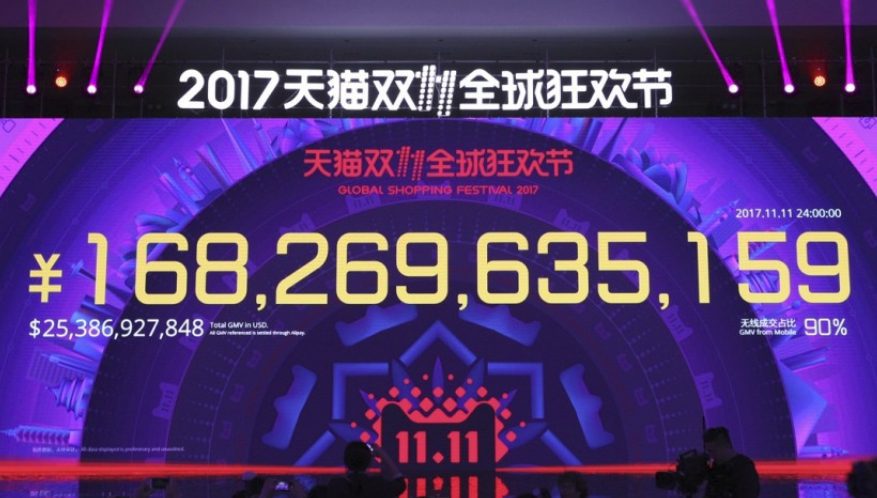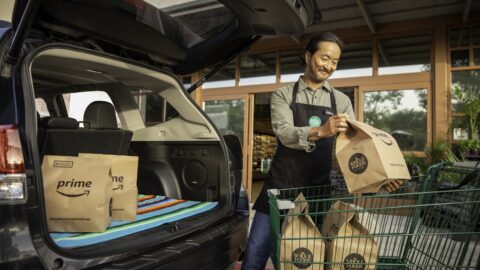Alibaba’s Singles Day has officially kicked off the global holiday push in a massive way, doubling the $12.8 billion in online sales generated between Thanksgiving Day and Cyber Monday in 2016. The e-Commerce giant sold $25.3 billion in merchandise through its marketplaces on Nov. 11, a 39% increase over the previous year.
Additionally, Alibaba hit a record $18 billion in gross merchandise volume (GMV) in just 13 hours on Saturday, eclipsing last year’s record of $17.8 billion in 24 hours. Daniel Zhang, CEO of Alibaba Group, attributed the increase to the company’s “new retail” strategy, which is designed to blend online, offline, logistics and data across a single value chain. A remarkable 90% of the GMV was generated on mobile devices, a marker of the power and widespread acceptance of Chinese mobile payment platforms.
Fung Global Retail & Technology attributed the major GMV increase to three specific factors:
Advertisement
-
Alibaba incorporated significant offline retail offerings into the event. The company partnered with 1,000 brands, including L’Oréal, Mondelēz, Nestlé and Procter & Gamble to set up 100,000 smart stores in 31 cities in China. Shoppers at these stores could browse merchandise and then purchase items via Alibaba’s e-Commerce platforms by scanning QR codes on the items in the stores;
-
40% more brands and retailers — 140,000 — participated in the event; and
-
Alibaba extended the shopping festival from a one-day event into a seasonal promotion, in a move similar to those made by retailers such as Amazon and Best Buy.
The shopping day also succeeds in bringing businesses of all sizes to the forefront through technology integration. This perhaps makes Singles Day more welcoming to smaller Chinese merchants than Black Friday has been to smaller U.S. retailers in recent years.
“Alibaba has invested substantially in developing technologies that empower Chinese small- and medium-size enterprises (SMEs) to participate in the festival,” said Deborah Weinswig, the Managing Director at Fung, in a report. “The company enabled some 600,000 mom-and-pop convenience stores and 30,000 rural retail centers in China to participate in the shopping event for the first time this year through its ‘LST’ or ‘retail integrated’ technology. LST is a cloud-based system that provides smart merchandise solutions and digital payment, inventory management and smart logistics systems for owners of small convenience stores.”
Mobile Powers 90% Of GMV, Well Ahead Of U.S. Adoption
Beyond those factors, it’s clear that mobile continues to be a massive force on Singles Day in a way that hasn’t been replicated during any other shopping day, in any country. Total mobile GMV settled through mobile payments platform Alipay accounted for an astounding 90% of total GMV, compared to 82% last year. Alipay processed 1.48 billion total payment transactions, up 41% from 2016, and processed 256,000 transactions per second at peak.
In comparison, mobile shopping is anticipated to account for 34% of online purchase revenue in the 2017 holiday season in the U.S. This illustrates the major gap that still exists between mobile commerce in China and the rest of the world, particularly when it comes to the sophistication of mobile payments platforms.
The top countries selling in China throughout Singles Day include Japan, the U.S., Australia, Germany and South Korea. Of the 140,000 brands and retailers that participated in the event, 60,000 of them were international. As an example of U.S. success, Nike ranked number five on the list of top-selling brands of all categories on Tmall for GMV, while Apple was the best-selling brand in the mobile phone category.
Singles Day Produces Big Results For Regional Retailers
While Alibaba created the shopping day and has since reaped its ultimate benefits, other retailers in the region capitalized on the event’s surging popularity. Alibaba’s biggest rival, e-Commerce giant JD.com, saw sales reach $19.1 billion in the 11 days up to and including Singles Day, an increase of 50% from last year. JD.com’s biggest movers during the day included fresh foods and cosmetics; the retailer sold 500,000 Thailand black tiger shrimp and 55 million facial masks over the period.
The event generated $123 million of gross merchandise value for online platform Lazada, representing a 171% increase since last year’s Singles Day. Shoppers on the company’s Southeast Asian marketplaces ordered 6.5 million items, 191% more than last year.









